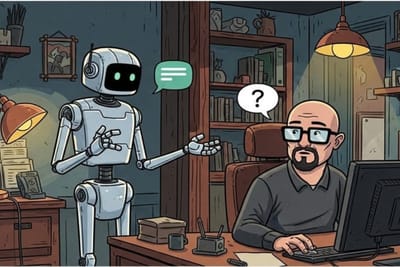What to Do When the Interviewer Isn't Prepared

I do quite a bit of interviewing by choice (well over 200 by my count). I just don't see how you get the word out on a new book or product offering without making yourself available. Unfortunately, though, all too often the interviewer hasn't done his or her homework. In this quick post, I'll discuss what to do if you happen to find yourself in this precarious situation.
Humanize the interviewer
Maybe Mr. Reporter or Ms. Talk Show Host is just swamped. Maybe the dog ate her homework or an emergency prevented him from reading your book or article, test-driving your product, etc. View the person asking the questions as an actual person. Empathize.
Do not get upset
You have a right to be a little miffed. After all, you took time out of your schedule and the interviewer could have at least spent five minutes checking out your web site, right? I couldn't agree more, but getting upset serves very little purpose. Go to a bar later ...
In the meantime, remember that potential listeners, viewers, and readers may very well have the same questions as your interviewer. That is, you can still educate the interviewer's audience--as well as the interviewer.
Answer the questions asked
Perhaps you didn't show up to talk about events in China, AOL, the Boston Celtics, the most recent Twitter redesign, or how to monetize a website. Being evasive or completely non-responsive is only going to irritate the interviewer and, trust me, things are likely to spiral downward from there.
View the person asking the questions as an actual person. Empathize.
Do your part, especially if you're live. Play ball. Remember the previous rule.
But steer the answers into a better direction
Even with oddball or not totally relevant questions, you still have an opportunity to influence the conversation. Many if not most questions have a great deal of wiggle room. For instance, I was asked on a recent TV appearance about the "stickiness of websites." Now, I can talk about this ad nasueum, but it wasn't terribly germane to the supposed topic of the interview. And it can open Pandora's Box.
No bother.
I said a few things to answer the question, but related it on the fly to platforms and, in this case, Facebook.
Once I moved the conversation closer to my heart (intentional Rush reference), the interviewers improvised and started asking me questions related to the book.
Know when to say "I don't know"
Even chatty types like me occasionally get stumped. In fact, you could write several libraries filled with large books about what I don't know. And that's an important limitation to understand. You'll do a few things by being honest when stumped. First, you will communicate to the interviewer that you respect his/her time. More important from your perspective, though, you'll save valuable time. You can then hopefully answer the questions that you were supposed to answer from the get-go.







Member discussion